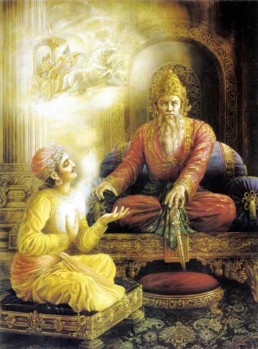Swami Chinmayananda Commentary
In this state of mental confusion, when his emotions have been totally divorced from his intellect, the ‘objective-mind,’ without the guidance of its ‘subjective-aspect,’ runs wild and comes to some unintelligent conclusions. He says, ‘I desire neither victory, nor empire, nor even pleasure.’ It is a recognised fact that a patient of hysteria, when allowed to talk, will, in a negative way, express the very cause for the attack. For example, when a woman, hysterically raving, repeatedly declares with all emphasis, that she is not tired of her husband that she still respects him, that he still loves her, that there is no rupture between them, etc., she, by these very words, clearly indicates the exact cause of her mental chaos.
Similarly, the very denials of Arjuna clearly indicate to all careful readers how and why he got into such a state of mental grief. He desired victory. He urgently wanted the kingdom. He anxiously expected to win pleasures for himself and his relations. But the challenging look of the mighty Kaurava forces and the great and eminent warriors standing ready to fight, shattered his hopes, blasted his ambitions, and undermined his self-confidence and he slowly developed the well-known “Arjuna-disease,” the cure for which is the theme of the Geeta.
Adi Sankara Commentary
Sri Sankaracharya did not comment on this sloka. The commentary starts from 2.10.
The Bhagavad Gita with the commentary of Sri Sankaracharya – Translated by Alladi Mahadeva Sastry
Holy Geeta – Commentary by Swami Chinmayananda
The Bhagavad Gita by Eknath Easwaran – Best selling translation of the Bhagavad Gita
The Bhagavad Gita – Translation and Commentary by Swami Sivananda
Bhagavad Gita – Translation and Commentary by Bhaktivedanta Swami Prabupadha
Srimad Bhagavad Gita Chapter 1 – Verse 31 – 1.31 nimittani cha – All Bhagavad Gita (Geeta) Verses in Sanskrit, English, Transliteration, Word Meaning, Translation, Audio, Shankara Bhashya, Adi Sankaracharya Commentary and Links to Videos by Swami Chinmayananda and others – 1-31

